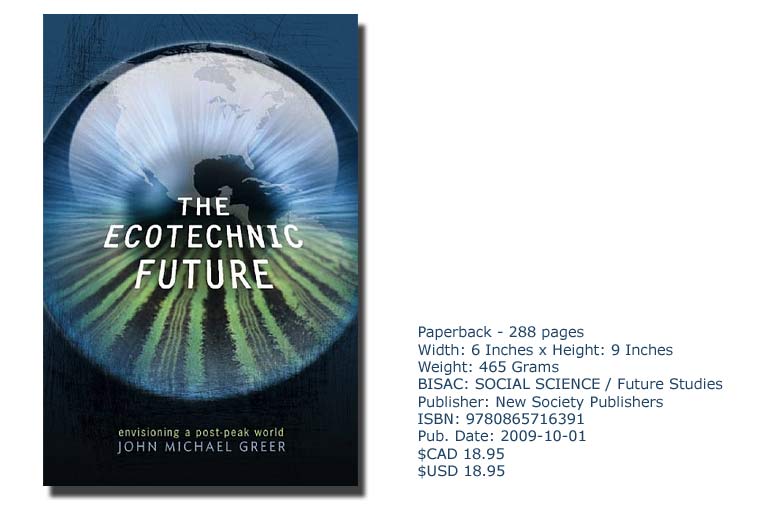Book Review of an excellent road map to a possible future way of living. The American Archdruid - yes, he really is a druid - and ecological author John Michael Greer has written a book called The Ecotechnic Future: Envisioning a Post-Peak World, a follow-on to his analysis of the short term predicament our society is in: The Long Descent.
He defines eco-technics as ''The Craft of the Home'' and by home he means the ''Ecological Transition Community'': the retaining and renewing of skills and practices to help us through an uncertain future so we end up with a civilised society with appropriate technology.
As we move further into the ecological crisis caused by the interactions of Peak Oil and Climate Change on our fragile economic system, we will be facing a bumpy descent - bad times punctuated by changes which seem to be recovery, followed by more bad times. This is the ''Long Descent'' into a new society which Greer estimates will take one to threel hundred years. Our present global society is based on ''a brief period of extravagance in which we squandered half a billion years of stored sunlight.'' [the energy held in fossil fuels].
Greer tells us that we have reached ecological limits, and must face up to the fact that ''deeply unsatisfactory conditions cannot be solved but must be lived with...'' He warns that we won't wake up one morning and find ourselves in a "Mad Max" situation, fighting over dog food or fuel with crazed survivors - this is apocalyptic fantasy. He foresees that the descent will cause a gradual transition to at first a ''scavenger society'', where high tech items are reused and recycled, and unsustainable buildings like skyscrapers are pulled down by hand to cannibalise the high quality steel encased therein.
He also says that the cities will be lifeboats, not isolated self-sustaining eco-communities which he regards as barely viable for many reasons, including that ''I have met far too many people who don't know enough about plant care to keep a potted petunia alive, and have never put in a full day of hard physical labour in their lives - most middle-class Americans haven't - but talk about the life of subsistence farming they expect to lead in a lifeboat ecovillage as industrial civilisation crashes around them.''
As Greer looks further into the future, he sees the ending of cultural trends which grew out of the revolutions of the 18th and 19th centuries and which have guided the progress of the industrialising world ever since. He sees us discarding the cultural blinkers which have made us regard the natural world as a minor irrelevance to our energy consuming industrial infrastructure: ''our species is finally beginning to learn that treating the environment as though it exists solely for humanity is a self-defeating habit...once history is recognised as an ecological phenomenon, the next step is to search history for processes that appear across the range of ecosystems in the nonhuman world and look for their equivalents in human affairs.'' This is a sophisticated way of saying we need to move to a balance with nature, and find a way for humans to be what biologists call ''R-selected'': a steady, balanced climax community, rather than a ''K-selected'' fast-growing ecosystem, exemplified by weeds which spread fast, then die off as they destroy the very conditions that made their growth possible.
This is an extremely erudite book, filled with references to philosophies, and ancient works, which is also readable and an exciting addition to what might be called the ''libraries of the future'', which try to make sense of our predicament and offer not just hope, but a intellectual route map to a better way of living.
Links:
The Ecotechnic Future: Envisioning a Post-Peak World










